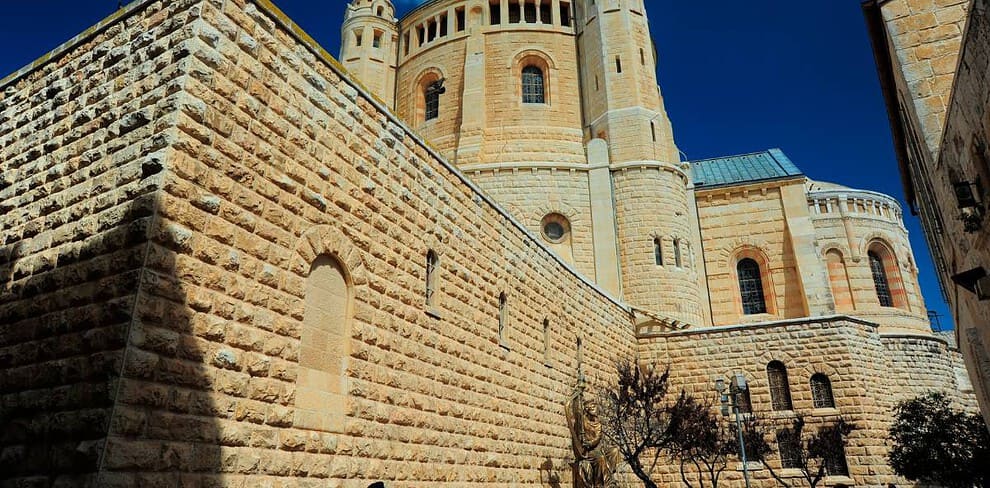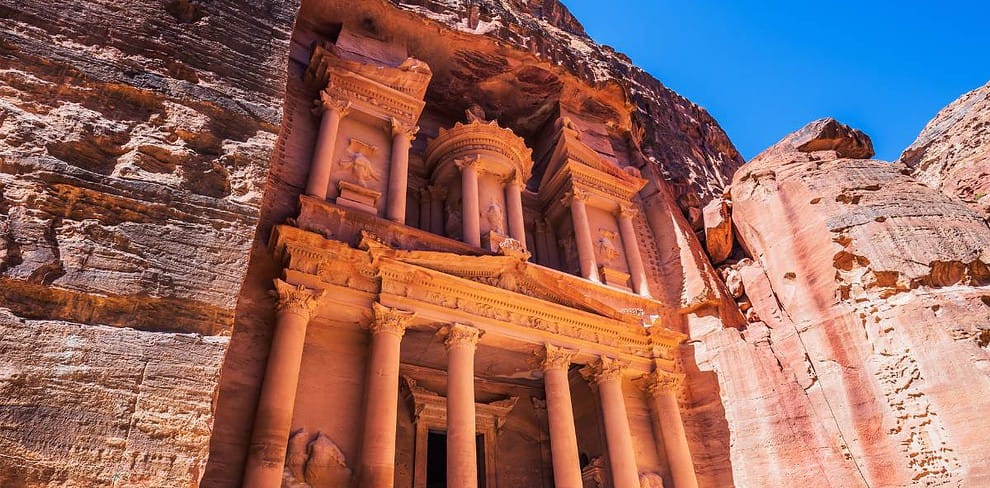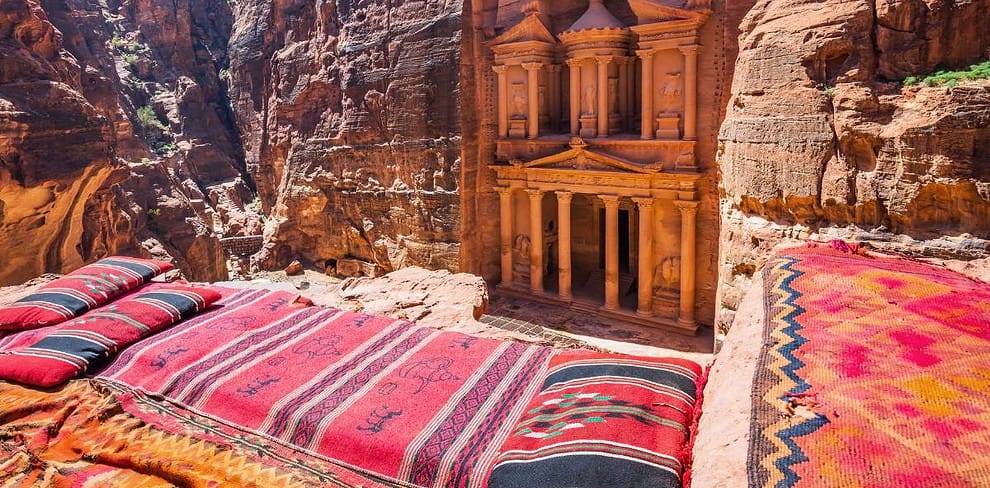Table of Contents
Delve into Jordan culture as we offer you a comprehensive insight into the customs of Jordan, along with its rich and dynamic heritage, which encompasses traditions, values, and unique customs and practices.
Jordanians highly prioritize hospitality, extending warm welcomes to their guests. Family holds a central role in Jordanian society, characterized by strong bonds and a strong sense of community. It’s essential to acknowledge that Jordan culture is in a constant state of development, shaped by historical occurrences, regional dynamics, and global interactions.
Gaining an understanding of culture of Jordan can provide valuable perspectives into the intricate and multifaceted society of the nation.
Jordan Culture
Here are the most important points to begin learning about Jordan culture and customs:
- Ethnic Diversity: Jordan is home to a diverse mix of ethnic groups, each with its own customs and traditions. Jordanians of Arab descent, Circassians, Chechens, and Bedouins are some of the major ethnic communities.
- Languages: The official language is Arabic, but English is widely spoken, especially in urban areas. Numerous regional dialects and languages are also in use.
- Islamic Practices: Jordan is predominantly a Muslim country, and Islam plays a significant role in Jordan culture, influencing daily life, values, and societal norms. This includes daily prayers, fasting during Ramadan, and adherence to Islamic dietary laws. The majority of Jordanians practice Sunni Islam.
- Greeting Etiquette: Greetings are an essential part of Jordan culture. Handshakes are common between men, while men and women usually do not shake hands. Instead, they greet each other verbally with polite phrases.
- Traditional Clothing: Traditional Jordanian clothing, such as the “dishdasha” for men and “abayas” for women, is commonly worn. Traditional attire varies by region and ethnicity but remains an integral part of Jordanian identity.
- Cuisine: Jordanian cuisine features dishes like “mansaf,” “kabsa,” and a variety of mezze (small appetizers). It reflects a fusion of Levantine and Middle Eastern flavors.
- Hospitality: Jordanians are known for their warm hospitality. When guests visit, they are offered tea, meals, and often a place to stay. It is considered impolite to decline such offers.
- Respect for Elders: Respect for elders is a deeply ingrained custom. Younger individuals show deference to their seniors through words and actions.
- Arts and Crafts: Jordan has a rich tradition of arts and crafts, including intricate mosaics, pottery, calligraphy, and embroidery.
- Music and Dance: Traditional Jordanian music includes instruments like the “oud” and “darbuka.” Folk dances are an integral part of cultural celebrations.
- Celebration of Festivals: Jordanians celebrate various religious and cultural festivals, such as Eid al-Fitr, Eid al-Adha, and Independence Day. These celebrations often involve special prayers, feasts, and gatherings with family and friends.
- Family and Community: Family is central to Jordanian society, and strong community bonds are essential for support and social cohesion.
- Gender Roles: Gender roles are traditionally defined, with men and women often occupying distinct social spheres. However, changes are occurring, particularly in urban areas.
- Arranged Marriages: Arranged marriages are a prevalent custom in Jordan. Families play a central role in matchmaking, and the union is seen as a commitment not only between individuals but also between families.
- Historical Influence: Jordan’s rich history, including its archaeological sites like Petra, has a significant influence on its culture and identity, fostering a sense of historical pride.
These customs are essential aspects of Jordan culture and are readily visible in everyday life, reflecting the country’s rich cultural heritage and strong sense of community and tradition.
Jordan Traditional Attire
Jordan traditional attire reflects the country’s rich cultural heritage, regional variations, and historical influences. The clothing worn by Jordanians serves both functional and cultural purposes, showcasing the diversity of the nation.
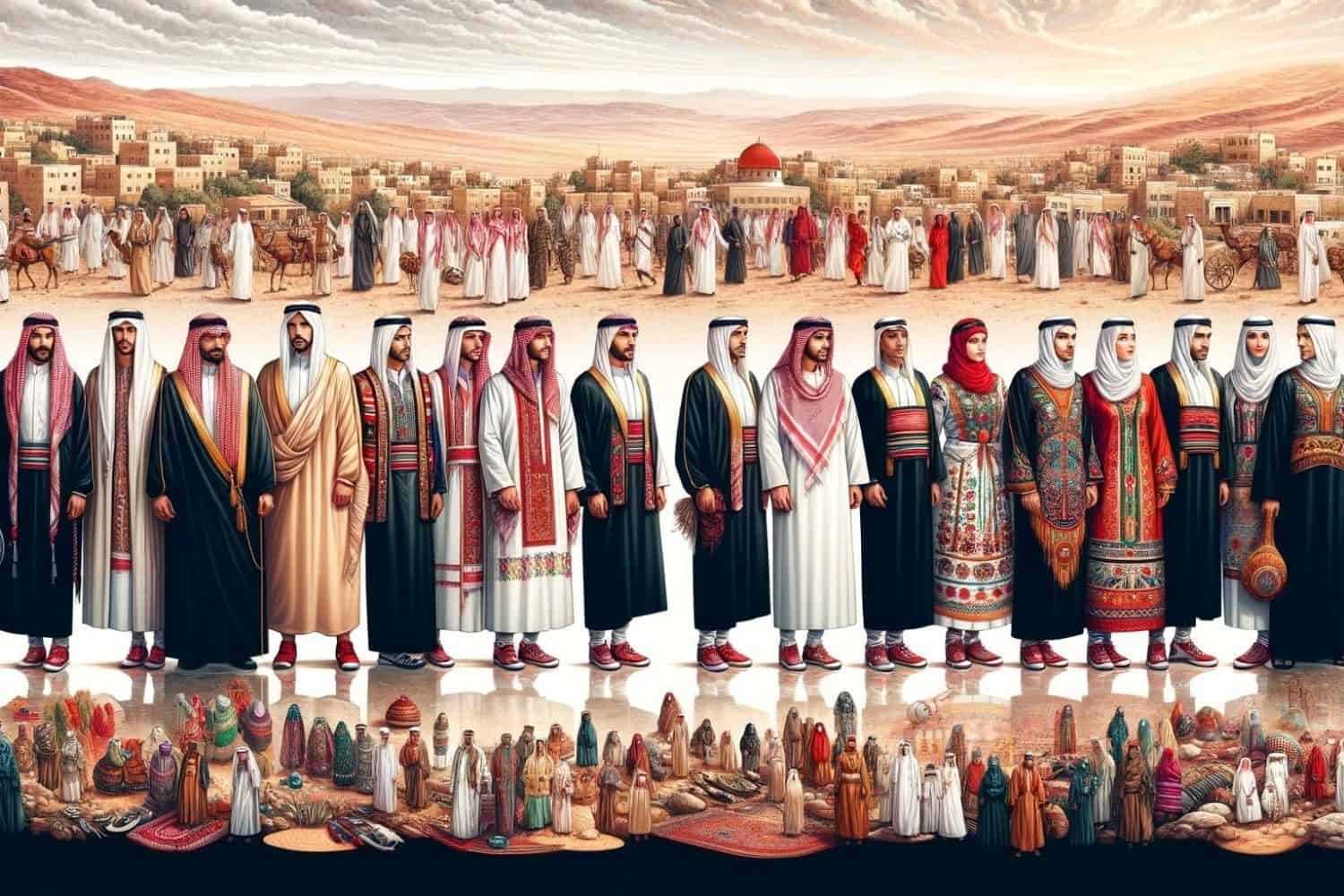
1. Regional Variation: Jordan’s traditional clothing varies across regions, influenced by local climate, lifestyle, and ethnic traditions. In the colder northern areas and mountainous regions, people tend to wear heavier, layered garments, while in the warmer southern areas, lighter clothing is preferred.
2. Bedouin Dress: The traditional attire of the Bedouin communities in Jordan often includes a “thobe” for men and a “jalabiya” for women. These long, loose-fitting garments are well-suited to the desert environment and offer protection from the sun and sand. Men often accessorize with a headscarf called a “keffiyeh” or “shemagh.”
3. Circassian and Chechen Attire: Circassian and Chechen communities in Jordan have their own distinct traditional clothing. Men from these communities may wear a long coat called a “cherkeska,” while women often wear colorful dresses with intricate embroidery.
4. Tribal Clothing: Jordan is home to various tribal communities, each with its unique attire. Some tribal members may wear colorful robes and head coverings that signify their tribal affiliation. These garments can be both functional and symbolic.
5. Modesty and Cultural Significance: Traditional Jordanian clothing emphasizes modesty, with loose-fitting garments covering the body. The choice of colors, fabrics, and embroidery often holds cultural and regional significance, and the attire may indicate one’s social or marital status.
6. Special Occasion Attire: Jordanians dress elaborately for special occasions and celebrations, with vibrant and ornate clothing adorned with intricate patterns and jewelry. Weddings, festivals, and religious events provide opportunities to showcase their finest traditional attire.
7. Adaptation to Modernity: While traditional attire remains important, urbanization and modern influences have led to the integration of Western clothing in daily life, especially in cities like Amman. Many Jordanians now combine traditional and contemporary clothing, reflecting evolving lifestyles and global fashion trends.
Jordan’s traditional attire is not just clothing; it is a living expression of the nation’s cultural diversity, history, and identity. It stands as a testament to the rich tapestry of traditions that have shaped Jordanian society for generations.
Jordan Marriage Traditions
Jordan marriage traditions are deeply rooted in its diverse cultural and religious heritage, with variations across different ethnic groups and regions. These traditions play a significant role in Jordanian society, reflecting both historical practices and contemporary influences.
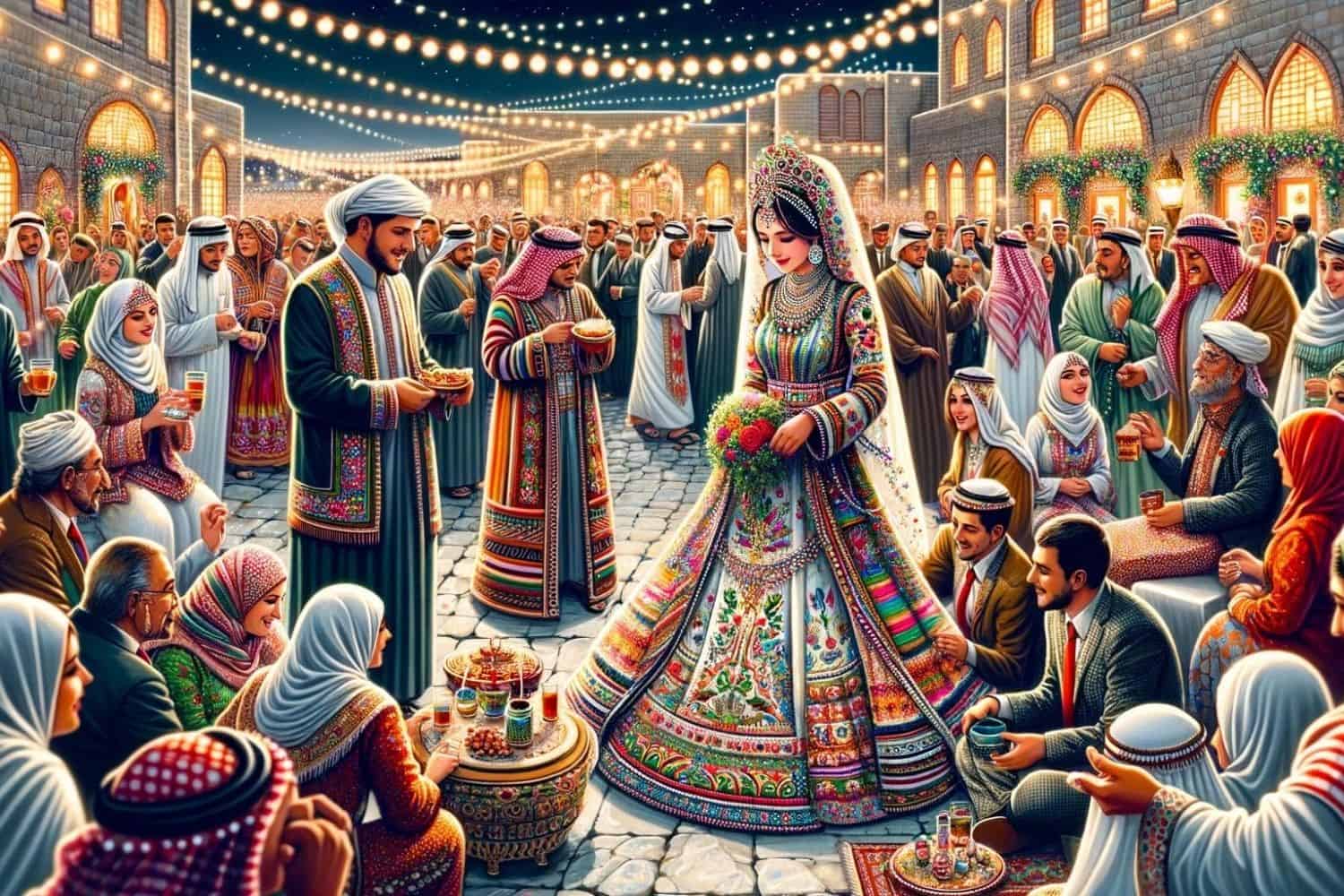
1. Arranged Marriages: Arranged marriages are common in Jordan. Families often play a pivotal role in selecting suitable partners for their children. Arranged marriages are seen as a way to maintain cultural and social cohesion and ensure compatibility between families.
2. Matchmakers: Matchmakers, known as “khawagaat” in Arabic, assist in finding suitable matches for individuals. They consider factors such as family background, social status, and compatibility when suggesting potential partners.
3. Engagement: Once a suitable match is found, the engagement process begins with a formal agreement between the families. This agreement, called a “kitab al-khitbah,” marks the commitment of the couple to marry.
4. Wedding Celebrations: Jordanian weddings are elaborate affairs that often span multiple days. They typically involve traditional rituals, feasting, music, and dancing. The main wedding ceremony, known as the “katb al-kitab,” involves the signing of the marriage contract and is typically held in a mosque or at home.
5. Dowry (Mahr): The groom is expected to provide a dowry to the bride as a sign of commitment and financial security. This practice varies in size and form depending on the families and regions involved.
6. Bridal Attire: Brides typically wear colorful and heavily embroidered dresses, often accompanied by intricate jewelry. The attire varies by region and ethnic group, with Bedouin, Circassian, Palestinian, and other brides showcasing distinct styles.
7. Post-Wedding Customs: After the wedding, various traditions may continue, such as the “waleema,” a celebratory feast hosted by the groom’s family, and the “hijra,” a ceremony where the bride officially enters her new household.
8. Social and Religious Significance: Marriage is not only a social but also a religious sacrament in Jordan, with strong ties to Islamic customs and traditions. The marriage contract, called the “aqd al-zawaj,” is performed according to Islamic principles and often involves recitation from the Quran.
9. Family and Community Involvement: Jordanian weddings are not only a celebration of the couple but also a community event. Extended families and the broader community play essential roles in supporting and participating in the festivities.
10. Contemporary Changes: In urban areas and among the younger generation, there is a growing trend toward love marriages, where individuals choose their partners based on personal preferences. However, these unions may still involve traditional customs and ceremonies.
Jordanian marriage traditions reflect the importance of family, community, and cultural identity in Jordanian society. While some practices have evolved over time, they continue to be a significant aspect of Jordanian life, preserving the country’s cultural heritage and social bonds.
Jordan Food Culture
Jordan food culture is a captivating and diverse reflection of its history, geography, and the fusion of culinary traditions from the Levant, Mediterranean, and Arabian Peninsula.
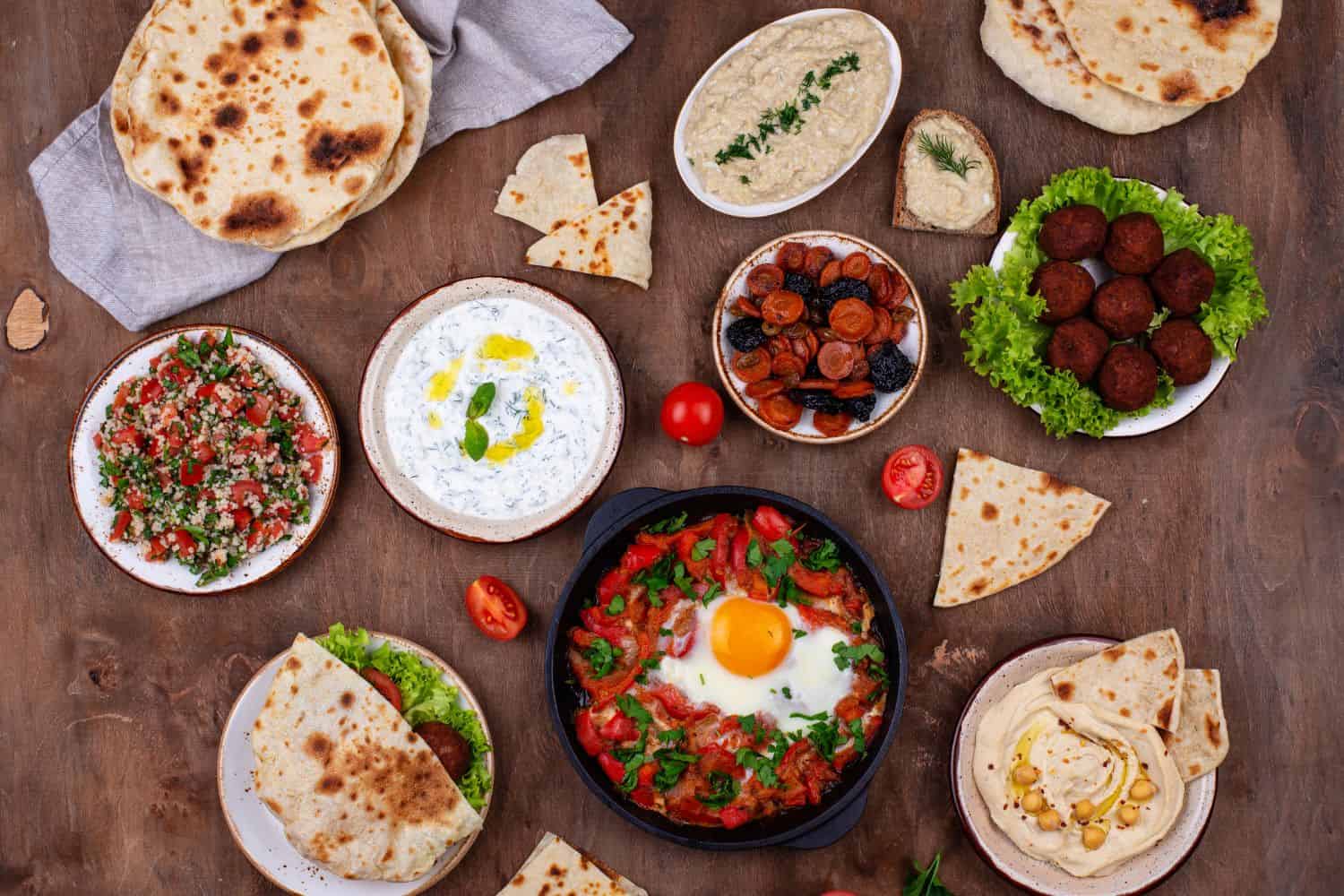
- Regional Variation: Food from Jordan diverse geography, encompassing fertile valleys and arid desert landscapes, has fostered a variety of regional cuisines. Each region integrates local ingredients and culinary traditions, contributing to a flavorful tapestry of dishes.
- Staple Foods: Jordanian cuisine relies heavily on staple foods like rice, bread (especially pita bread or Jordanian flatbread), and grains such as bulgur wheat and rice. Rice dishes like “mansaf” and “makloubeh” are particularly cherished.
- Kebabs and Grilled Meats: Grilled meats, notably kebabs, are a hallmark of Jordanian cuisine. Lamb, chicken, and beef are commonly featured, often marinated in a blend of spices before grilling.
- Flavorful Spices: Jordanian cuisine makes use of a wide variety of spices and herbs, including sumac, cumin, coriander, and mint. These seasonings lend depth and complexity to the dishes.
- Traditional Dishes: Jordanian cuisine boasts traditional dishes such as “kibbeh” (ground meat and bulgur patties), “manakish” (flatbreads with toppings), “sambousek” (savory pastries), and “maqluba” (upside-down rice dish), which often exhibit regional variations.
- Use of Yogurt: Yogurt is a common ingredient in Jordanian cuisine and is featured in dishes like “jameed” (yogurt sauce), “laban” (yogurt drink), and as a side accompaniment.
- Tandoori Baking: The tandoor oven, a staple in Jordanian cuisine, is frequently used for baking bread and preparing dishes like “shish taouk” and “manakish.”
- Sweets and Desserts: Jordanian sweets often incorporate ingredients like nuts, dates, and orange blossom water. “Knafeh” and “atayef” are popular desserts, especially during festive occasions.
- Tea Culture: Jordanians have a strong tea culture, with black tea being a favored choice. It is typically brewed strong and served sweet, often accompanied by social gatherings and conversations.
- Family and Community Dining: Jordan culture places a significant emphasis on communal dining. Families and friends often come together around a “sofra” (tablecloth) to enjoy meals collectively.
- Influence of Jordanian Diaspora: Jordanian cuisine has gained recognition and popularity in various parts of the world due to the Jordanian diaspora. Jordanian restaurants in international cities offer a taste of Jordan culture to diverse audiences.
- Resilience and Adaptability: Despite various challenges, Jordanian cuisine has endured and evolved. The creativity of Jordanian cooks shines through as they continue to craft delectable dishes even in demanding circumstances.
Book our services
Our services as a travel agency in Jordan ensure that your journey is not only enjoyable but also informative and hassle-free. Jordan’s cultural delights, historical marvels, and natural wonders await your exploration with RJ Travel LLC. Our Jordan Private Tours are designed to immerse you in the rich cultural heritage, historical significance, and breathtaking landscapes of this extraordinary nation.
Contact Us and our team will make sure to help you plan your trip to Jordan when it’s safe and ready for travel. Whether you’re interested in joining a pre-arranged Jordan small group tour or creating a custom itinerary, we are here to make your Jordanian adventure an unforgettable reality.
More About Jordan
[the-post-grid id=”50380″ title=”Jordan Main page”]
Book Your Trip to JordanToday!
Embark on an unforgettable journey and explore the allure of Jordan through our exclusive tours.


